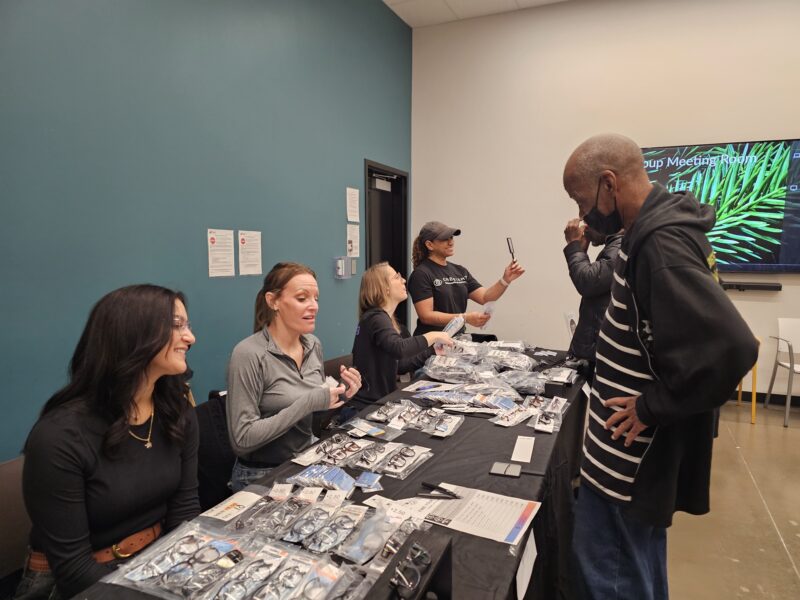Understanding vision loss and its causes can be complicated and anxiety inducing. Are there vision impairments that are untreatable? What exactly does the term “low vision” mean and how does someone know if they have it? The Vision Council had the opportunity to ask low vision specialist, Dr. Thomas Porter, OD some common questions that patients around the country have and he was kind enough to provide some answers below.
Dr. Porter, is an Associate Professor in the Department of Ophthalmology at Saint Louis University’s Eye Institute where he serves as director of the Low Vision Service. He is also an Adjunct Clinical Professor at the University of Missouri-School of Optometry in St. Louis. Dr. Porter became a Diplomate Fellow in the Low Vision Section of the American Academy of Optometry in 1996.

Is losing one’s vision a natural part of aging—something we all just have to deal with as we get older?
Not necessarily. Many people have very good eyesight through their senior years, needing just reading glasses or regular prescription glasses to see well. With glasses on, many seniors have normal vision (or close to it) and can read, drive and perform their daily living tasks as they have their whole life—though usually with a bit more illumination.
Is loss of vision common and will it lead to blindness?
Vision loss is actually very common. Over 20 million people in the US are visually impaired and report having difficulty seeing even with glasses or contacts. Fortunately, most cases of vision loss are slight to moderate in severity and do not progress to blindness.
What causes people to lose their vision and can prescription glasses help?
Eye diseases such as macular degeneration, diabetic retinopathy, glaucoma and cataracts can cause a loss of vision—often called low vision. These eye diseases cause permanent dark spots or hard to see areas in one’s vision or, in some cases like with glaucoma, tunnel vision. Unfortunately, regular prescription eye glasses which can clear up blurry images caused by more common conditions like near-sightedness, far-sightedness and presbyopia, cannot help those with eye diseases that cause vision loss. Fortunately, though, there are other solutions that CAN help (please read further!).
How will I know if I have one of these eye diseases that cause vision loss?
You should get an annual eye exam from an eye doctor so that they can test your vision and check your eyes for any signs of these eye diseases. And be sure to contact your eye doctor immediately if you notice any sudden changes in your vision like wavy lines, dark spots or other unusual things in your field of view. Many eye diseases are not painful so the first thing you may notice is a change in your vision.
I have macular degeneration and my eye doctor said nothing more can be done—is that true?
Not exactly. What they mean is that nothing more can be done surgically or therapeutically to treat the eye disease and bring back the vision that was lost. They may have treated your eye disease with drugs or surgical treatments that slowed or stopped the progression of the vision loss, but they can’t restore vision back to the way it was before. However, there is a specialized eyecare service called low vision care which includes the dispensing of what are called low vision devices which maximize your remaining vision and can help you continue reading, seeing details on television and performing your usual daily living tasks.
What is low vision care and what are low vision devices?
Low vision care (or vision rehabilitation) is a service provided by certain eye doctors and vision rehabilitation professionals in which a specialized exam is done from which it is determined which specific low vison devices will work to meet your particular vision needs and goals. Low vision devices are magnification devices including hand-held & stand magnifiers, high-powered spectacles, telescopes & monoculars, electronic magnifiers and special tinted glasses which improve contrast and make it easier to see.
How can I get a low vision exam and low vision devices?
The best place to start is always your regular eye doctor. If you don’t have one, begin with The Vision Council locator to find one near you! If you already have a regular eye doctor or an eye specialist who is treating your eye disease, but they don’t specialize in low vision, ask them for a referral to a low vision specialist. This is typically an eyecare or vision rehabilitation professional who has special training in offering low vision care. If they cannot provide a referral, certain eye doctor websites (like the American Optometric Association) have a Find a Doctor feature with an advanced search option where those that offer vision rehabilitation can be found. Low vision device manufacturers can also help you find someone to go to as well and a list of them can be found at www.thevisioncouncil.org/member-companies by searching on low vision.






